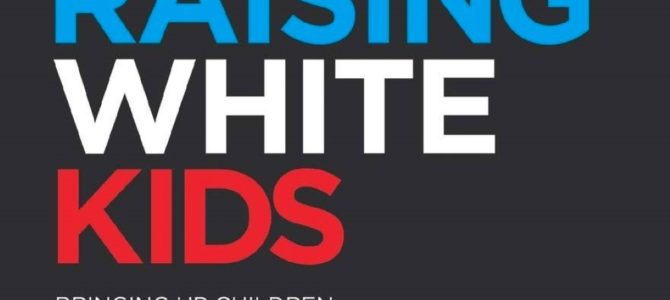
Is scientific racism making a comeback, this time through social science and in the name of anti-racism? “Raising White Kids: Bringing Up Children In A Racially Unjust America” makes sane-sounding headway into the same lunatic territory.
The author, Jennifer Harvey, is a credentialed apostle of racial awakening, a doyenne of the “problem of whiteness.” Before opening her manual on race-conscious parenting, it is useful to recap the context that brought it to our libraries.
Back in 1967, Stokely Carmichael and political scientist Charles V. Hamilton changed the character of the civil rights movement with the publication of “Black Power.” The racism of today’s anti-racists is built on the fictions of that founding text: “No matter how ‘liberal’ a white person might be, he cannot ultimately escape the overpowering influence — on himself and on black people — of his whiteness in a racist society.”
Now, it appears the American Library Association has embraced the endgame initiated by Carmichael and Hamilton. Led by ALA directives, public libraries promote the same ideological challenge to existing institutions and ethical norms that dominate academia. Martin Luther King’s “I Have a Dream” speech now draws criticism for ceding too much to bourgeois culture. Among today’s anti-racists, skin color trumps the content of character as a determinant of achievement.
In 1998, ALA leadership committed itself to five Key Action Areas on which to concentrate resources. The first key area was “diversity.” Engaged librarians promise to “decenter power and privilege” by employing “a social justice framework to ensure the inclusion of diverse perspectives.”
The ALA ensures those perspectives it deems ideologically sound. Among these are terms set by critical race theory, the tangled reasoning that informs Black Lives Matter: racism is the fons et origo of America; only whites are guilty of it.

Itself a racist assumption, the indictment has been on simmer since Carmichael and Hamilton set the condemnatory tone: “The goal of black people must not be to assimilate into middle-class America, for that class — as a whole — is without a viable conscience as regards humanity.” In the grip of moral fervor under the protection of the ALA, librarians are poised to bring the toxic brew to a boil.
My local library turned the flame up with Harvey’s “Raising White Kids.” Among anti-racist recommendations for young readers, this was the single entry showcased for parents. The book lends a reassuring patina of high-minded scholarship to Carmichael’s declaration “we must fill ourselves with hate for all things white.”
Harvey’s child-rearing philosophy begins with Ibram X. Kendi’s premise that color-blindness is a non-starter. To correct the failure of a color-blind approach, race-conscious parenting “insists on noticing and naming race early and often. Being race-conscious means thinking about, talking about, acting in response to the recognition or consciousness of race.” It’s race: all the time, every day, and in every way.

Racial wakefulness is crucial to white parents because “the racial identity white children develop is distinct from that of non-white children. . . . Differently raced children thus need different parental responses in search of cultivating their responses to live lives committed to equity and justice.” Young whites “are far, far behind their peers of color. Their racial understanding is underdeveloped, at best, deeply confused at worst.”
A fervid identitarian, Harvey argues for the “development of white racial identity.” A “healthy white racial identity” (a phrase used repeatedly) derives from “honest dialogue about the inherited experience of being white, as well as the history of whiteness.”
You might think that this sounds oddly analogous to the reviled sentiments of white nationalists. But, no, this is different. A “healthy” white child takes no pride in being white. On the contrary, reflection on the experience of “embodied self-awareness of being white” is what empowers white youngsters to escape house arrest in their own skin.
Messages of ethnic pride are good for black children; white ones have to learn their place. Children of non-color can acquire self-esteem but only in spite of being white:
Our radicalized bodies live, move, learn, work, and play, in larger racial scripts. We need to get this deeper dimension of race on the table. It. . . goes beyond language and concepts, and into bodies, habits, and space.
It is not easy having a white kid:
The hopes embedded in a commitment to race-conscious parenting require us to allow our children to be vulnerable and feel the ache and hurt of the harm that injustice causes. We may want to insulate our kids from it, but the humanity of even the youngest of our children is directly related to their ability to identify with that suffering.
This, “in spite of the fact that their hearts may be broken by it.”
Harvey’s veneer of intellectual honesty and scientific objectivity is a latter-day reprise of the “scholarship” of Leonard Jeffries. The former head of the black studies department at City College of New York, Jeffries taught crackpot theories of the “melanin factor” that made blacks superior to whites.
Harvey’s solemn emphasis on “racial scripts” and “racialized bodies,” and solemn reference to Racial Identity Theory, is the language of a newly minted pseudoscience making its way through academia. A White Racial Identity Model, spawn of the larger racial theory, is the brainchild 1990 of black psychologist Janet Helms, created in 1990 specifically for “people who identify as white.”
Harvey states without blushing: “Racism is a white thing.” The dogmas of intersectionality put blinders on those who might otherwise notice that the ideological substructure of anti-racism is eerily reminiscent of Nazi racial theorizing.
Her book’s cover blurb tells us only that Harvey, a professor of religion at Drake University, is an ordained minister in the American Baptist Churches USA. And that she “focuses on racial justice and white anti-racism.”
What it does not reveal is that Harvey shared a marriage license with another woman in 2007 and is equally focused on “queer and LGBT life in contemporary religious contexts.” Her profile at Drake mentions that she is a faculty advisor to programs supporting Diversity, Equity & Inclusion, the selfsame trinity honored by the ALA.

Drake’s bio adds: “Her recent publications include work on contemporary reparations movements in Protestant traditions, queer articulations of Christian traditions, and Native-Colonial dialogues on issues of environmental justice.” The sound of axes grinding is unmistakable. It is against this background hum that the book’s assertion begs to be judged.
Abington Press downplays Harvey’s resumé for good reason. Her fealty to identity politics has deep personal roots. Mainstream parents are unlikely to take lessons in child psychology and child-rearing from a lesbian who uses her own daughter as a test subject in a social engineering experiment.
There is cruelty in this burlesque of responsible parenting. It warps the emotional and psychological well-being of white children. And, if differently, of non-white ones as well. It makes enemies of those who would be friends.









